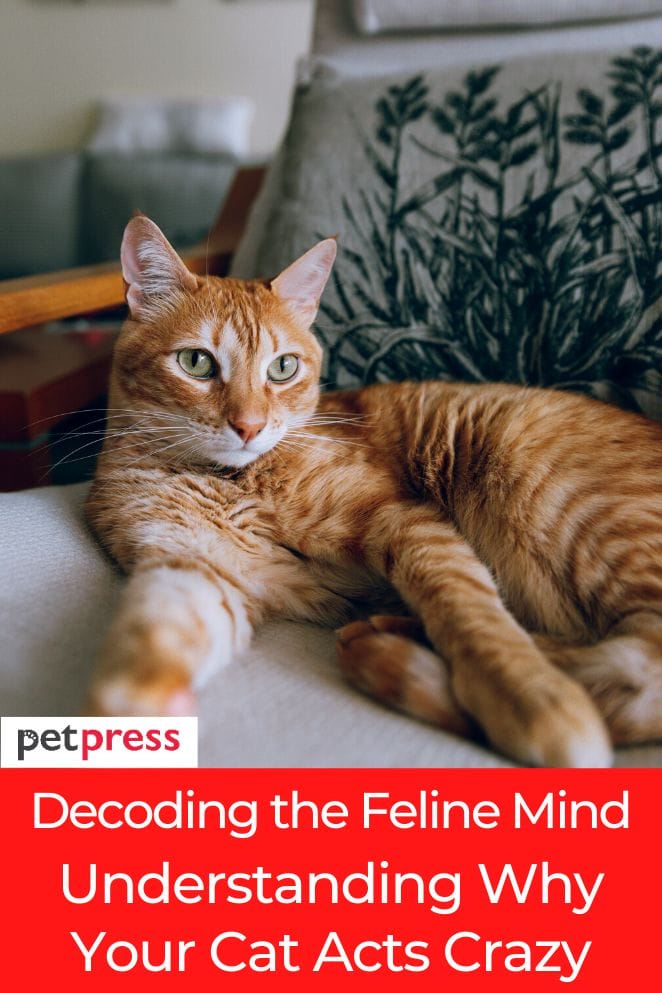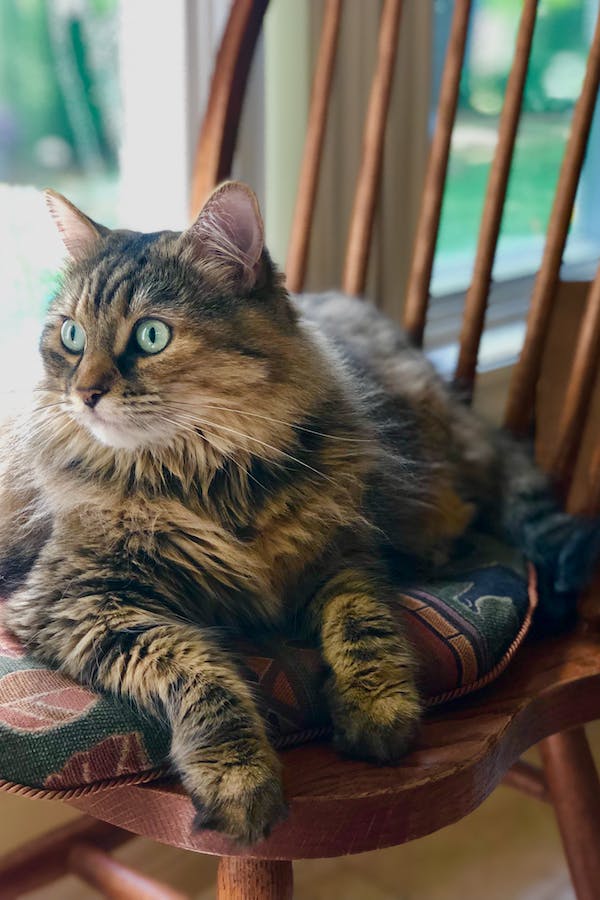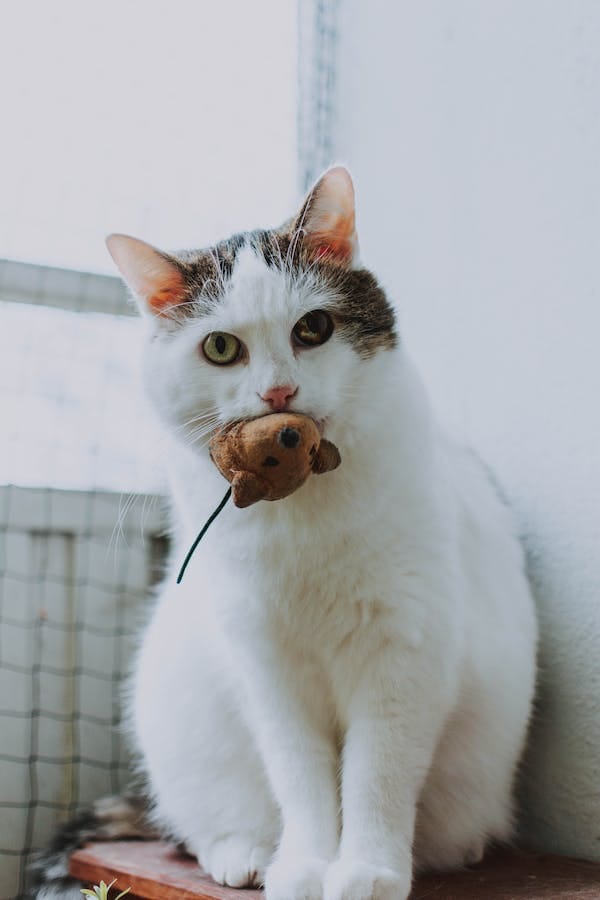
Cats, with their playful and curious demeanor, often exhibit behaviors that can perplex their owners.
Whether it’s sudden bursts of energy or unexplained aggression, understanding the reasons behind these antics is crucial for fostering a harmonious relationship with your feline friend.
In this article, we will delve into the various factors that contribute to cats acting “crazy” and explore actionable steps to address these behaviors.
Why Do Cats Act Crazy?
Feline Hyperesthesia Syndrome (FHS)
One possible reason why cats act crazy is due to a condition called Feline Hyperesthesia Syndrome (FHS).
This condition is also known as “rolling skin syndrome” because cats with FHS may suddenly start rolling their skin, twitching their tails, and acting aggressively.
According to a study published in the Journal of Feline Medicine and Surgery, FHS is more common in Siamese cats and can be triggered by stress, anxiety, or neurological problems.
Senility
Just like humans, cats can also suffer from senility as they age.
This condition is known as cognitive dysfunction syndrome (CDS) and can cause cats to act erratically, forget litter box training, and become more vocal at night.
According to a study published in the Journal of Veterinary Behavior, CDS affects around 28% of cats over the age of 11.
Predatory instinct
Cats are natural hunters, and their predatory instincts can sometimes cause them to act crazy.
For example, if your cat suddenly starts chasing shadows or attacking your feet, it may be because they are trying to satisfy their hunting instincts.
According to a study published in the Journal of Applied Animal Welfare Science, cats who are allowed to hunt and play with toys are less likely to exhibit aggressive behavior.
Fleas
Fleas are a common problem for cats, and they can cause a range of symptoms, including itching, scratching, and biting.
In some cases, fleas can also cause cats to act crazy, as they try to scratch and bite at their skin.
According to a study published in the Journal of Feline Medicine and Surgery, flea infestations can cause cats to become restless, agitated, and irritable.
Nocturnal instinct
Cats are naturally nocturnal animals, and they may become more active at night.
This can cause them to act crazy, as they run around the house, meow loudly, and knock things over.
According to a study published in the Journal of Veterinary Behavior, cats who are kept indoors may be more likely to exhibit nocturnal behavior, as they do not have access to the natural rhythms of the outdoors.

How to Stop Cats Act Crazy?
If your cat is acting crazy, there are several things you can do to help them. These include:
Prioritize exercise and playtime
Ensure your cat is receiving adequate exercise and playtime to channel their energy positively.
Engage in interactive play sessions, incorporating toys that mimic prey and stimulate their natural hunting instincts.
Regular physical activity can contribute to stress reduction and promote overall behavioral balance.
Introduce enriching toys
Puzzle toys and interactive feeders are valuable additions to a cat’s environment.
These engaging tools not only provide mental stimulation but also offer a source of entertainment.
By challenging your cat’s intellect, you can help prevent boredom and curb erratic behavior.
Seek veterinary consultation
If your cat’s behavior appears linked to Feline Hyperesthesia Syndrome (FHS) or Cognitive Dysfunction Syndrome (CDS), consulting with a veterinarian is crucial.
A professional assessment can lead to tailored recommendations, including medication or behavioral therapy, to manage and alleviate your cat’s specific symptoms.
Address flea infestations promptly
Fleas can significantly impact a cat’s well-being, leading to discomfort and restlessness.
Swiftly address any signs of flea infestation by administering appropriate flea medication.
Additionally, thoroughly clean your home to prevent re-infestation and ensure a comfortable environment for your cat.

What Are Some Natural Remedies to Calm Down a Crazy Cat?
Some natural remedies to calm down a hyper cat include:
Aromatherapy and essential oils
Certain scents, such as chamomile, have been known to work wonders for anxious cats.
However, it’s important to use essential oils safely around cats and always consult with a veterinarian before using any new products or supplements.
Calming aids
Look for products containing pheromones, rosemary, chamomile, and/or tryptophan.
These are available in the form of treats, collars, sprays, and plug-ins.
They work by releasing calming pheromones into the air or using a blend of calming and relaxing herbs to soothe cats through unavoidable changes to their environment.
Herbs and flower essences
Certain herbs and flower essences, such as catnip, can help calm cats.
However, it’s essential to administer these under the guidance of a veterinarian to ensure the safety and well-being of the cat.
Structured playtime
Providing structured playtime for your cat can help reduce unwanted or over-the-top behavior.
Engaging your cat in play with cat-friendly toys and allowing them to release their energy in a controlled manner can be beneficial.
Environmental adjustments
Creating a harmonious environment and making adjustments to reduce potential stressors can also help calm down a hypercat.
This can include providing a comfortable and safe space for the cat, as well as minimizing changes that may cause anxiety.

Conclusion
Cats may exhibit eccentric behavior due to various factors such as Feline Hyperesthesia Syndrome (FHS), senility, predatory instincts, fleas, and nocturnal tendencies.
To alleviate stress and enhance your cat’s comfort, it is crucial to comprehend the root causes of their actions.
If you observe concerning behavior in your cat, seeking advice and guidance from a veterinarian is always advisable.
FAQs
While cats cannot be diagnosed with ADHD, they can exhibit hyperactive behavior due to conditions like FHS or stress.
Yes, cats can suffer from cognitive dysfunction syndrome (CDS) as they age, which can cause them to act erratically and forget litter box training.
Providing your cat with plenty of exercise and playtime during the day can help reduce their nocturnal behavior. You can also try providing them with a comfortable sleeping area and keeping them on a regular feeding schedule.


GIPHY App Key not set. Please check settings